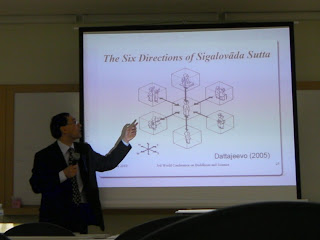In addition to the invited plenary speeches, the 3rd World Conference on Buddhism and Science scheduled three tracks on the second afternoon (2 December), one for each theme (Buddhism + Natural Science / Cognitive Science / Social Science) with 4 presentations in each. The conference organisers very kindly gave me the opportunity to present a paper in the section on Buddhism and Social Science; it's only through the generous support they gave that I decided to make the journey to Thailand just a year after my last visit.
I was listed as the first speaker after lunch, something of a mixed blessing with feelings of gastronomic contentment and the body's tendency to want a siesta! Sectional presentations were given up on the 4th Floor in the College of Religious Studies, a building nicely designed around a quad, and for my talk I think there were 40-50 people who wandered in, including a substantial number of bhikkhus, sitting towards the front. Mahidol University has many members of the Sangha as students on its courses, a feature that makes me imagine scenes from Oxford's early days when it's academic spaces was full of monastics also.
The title of my paper was Supporting Kalyāṇamittatā Online: New Architectures for Sustainable Social Networking, a theme that I've had in mind for several years. In my blog post On 'Friends' and other associations, I had already proposed as core to new designs the implementation of multiple relationship types for making a connection - at present, the norm is just the one, 'friend', which places colleagues and closest family members in the same basket. The key inspiration is the Buddha's teachings in the Sigalovāda Sutta, guidance to the householder Sigala, on how to cultivate true friendship. How one behaves should depend on the kind of relationship that one has and the Buddha divides these into 6 separate categories, one category for each cardinal point (N,E,S and W) plus above and below. There's an excellent diagrammatic representation of this in Phrabhavanaviriyakhun's book, Man's Personal Transformation, enough to get my onto my feet to explain it!
[photo credit: Mananya Pattamasoontorn]
I tried to emphasize the contrast these 6 directions with the single direction operative in most social networking sites today. That's a rather parlous state of social affairs, is it not? (In fact I even received assistance from Matthew Kosuta, the chair of the session, who provided a further illustration of the blackboard.)
Furthermore, the Buddha gives advice on how to cultivate each type of relationship, which suggests in application that the services available for each relationship type should vary accordingly.
A copy of my slides below:
In the Q&A and subsequent feedback, one question raised the underlying issue of control over online activities - there were several representatives of grassroots organisations who were concerned about being restricted in communications. My response was to suggest that it may depend upon how social networking sites are implemented - whether a single site [run by just one organisation] or distributed [in the manner of Diaspora]. Another key issue is the level of guidance - whilst most people that some is needed, there would be great resistance to any heavy-handedness whereby people are told what to do online, particularly in a way that takes away their freedom to choose.
I'm keen for the ideas to be shared, so I'm pleased that the paper itself is also available for download from the conference papers section (or a pre-formatted copy from my site). Please let me know if you have problems with access.

